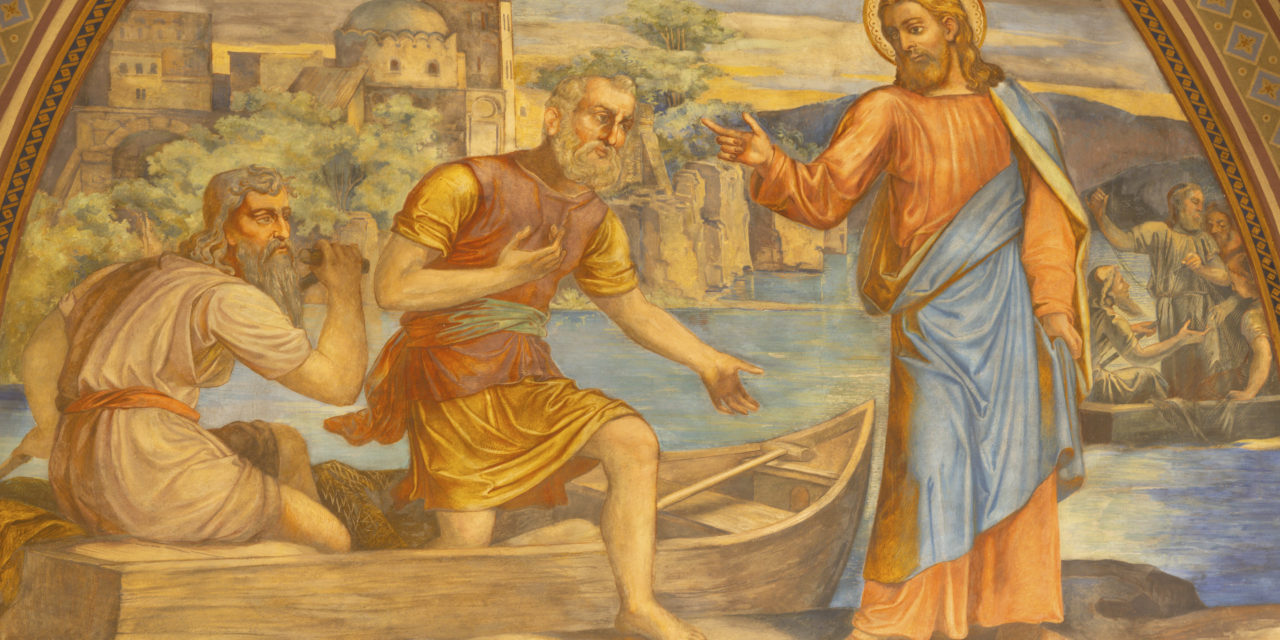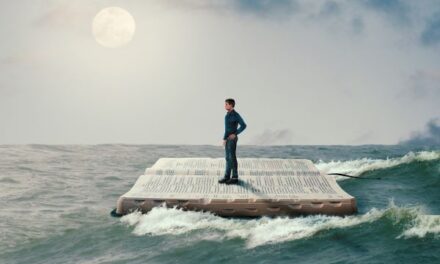PHOTOSHOPPED GROWTH
Steve Bietz
Burke County
Just a short distance down the shore from Capernaum is where fisherman, still today, clean their nets in a natural spring that sprays up on a slope overlooking the Sea of Galilee. My wife and I were just recently in the Holy Land and witnessed fisherman cleaning their nets there beside the Galilee. It is a spot where it is claimed that the circumstances of Luke 5 take place. “Now it happened that while the crowd was pressing around Him and listening to the Word of God, He was standing by the lake. And He saw two boats lying at the edge of the lake, but the fisherman had gotten out of them and were washing their nets. And He got into one of the boats, which was Simon’s, and asked him to put out a little way from the land. And He sat down and began teaching the people from the boat.” Luke 5:1-3
Christ had not been with the disciples as they had fished that night on the Sea of Galilee. Peter and Andrew owned one of the boats, and James and John owned the other boat. At this moment, the disciples, although following Jesus for a year, were still full-time fisherman and only part-time disciples. They were what we might call, “weekend disciples” who were still putting in a full week of running a fishing business.
Jesus shows up on the shore that morning, possibly they had all synchronized a prearranged meeting, but maybe Christ just shows up. The disciples are rinsing out the debris caught in their nets. That was all they had caught, just debris.
Several times in the gospels we’re shown that a crowd gathers unexpectedly. This is one of those times. And whatever they had planned for the day, Jesus adjusts the schedule to spend a substantial time talking with the multitude. But the crowd appears to have Jesus somewhat cornered as they close in around Him, and He is about to be standing in the lake. It is then that Jesus asks Peter to allow Him to get in his boat, and shove off away from the shore a little. The result is that Christ can sit in the boat and talk to the crowd without being pressed by His listeners, right into the water.
Following the closing prayer and the crowd begins to disperse, Jesus again calls on Peter to maneuver his boat. “When He had finished speaking, He said to Simon, Put out into the deep water and let down your nets for a catch.” Luke 5:4
In verse three of Luke 5, Jesus had said put out a little, and now we see Jesus requesting that Simon launch out into the deep. Shallow and then deep. Christ is about to ask these weekend disciples to abandon the fishing business. But here we see Jesus first measuring His part-time followers, to see how much they have grown. Are they ready, for the deep end of the pool, or must they stay in the shallows, and just “put out a little?”
When I went to elementary school in Atlanta as a first grader, the school I attended offend swimming classes. I wanted to learn to swim, so I signed up for a beginner’s class. They called it the “tadpole” level. They told us what time our classes were, and I showed up at the pool on my scheduled day. I remember thinking that it was odd, that none of the first graders that had also signed up for the “tadpole” class, were nowhere to be seen as those in the class gathered by the pool. Our instructor took us down to the deep end, and blew his whistle, signaling that we dive in and swim to the other side. I don’t think that I had ever dived into the water before, but I gave it my best. The rest of the class left me in their wake as they swam for the other side of the pool. I had also realized that the students in the swimming class were from the 3rd, 4th and 5th grades. Strange I thought. As I splashed and sank and splashed and sank, the instructor came to my rescue and pulled me back to the edge of the pool. As I caught my breath, he asked, “can you swim?” and I shook my head back and forth with the officially recognized meaning of NO. The instructor then said, “then why are you in the advanced swimming class?” Come to find out, there had been a paperwork snafu and my name had been put in the advanced swimming class instead of the beginner’s class. I was not ready to launch out into the deep. Simon, Jesus says, push out into the deep and we will discover if you have grown.
Throughout scripture, God shows sensitivity to the different stages of maturity in each person. For example, when God asks Abraham to push out a little into the shallows and leave Ur of Chaldea, God does not present to Abraham His plan to have him sacrifice his son Isaac. I wonder if Abraham would have chosen to follow God’s prompting at that stage of his growth if God had laid out the Mt Moriah appointment. Instead, God nurtured Abraham and became His friend, and only later, when the patriarch had grown enough, did God confront his friend with the ultimate test of loyalty.
When we spend time in the Old Testament, we see a pattern in which the Israelites keep repeating. It is a dangerous pattern of photoshopped growth. When an item is photoshopped, it is done to enhance the picture, hiding any blemishes and giving an altered appearance. Sometimes an item is so altered by the power of photoshop, it shows a fake situation.
The Israelites kept allowing religious practices, that were meant to deepen their relationship with God, only keeping them in the shallow end of the water. While sacrificing and fasting and not working on the Sabbath day, at the same time, they were heavily involved in idol worship.
And the pattern of staying in the shallow end would continue into the New Testament era. The Jews, in the days of Jesus, would attend church weekly, and be meticulous tithe givers and Sabbath keepers. However, they would simultaneously plan to murder Jesus. And it is rather obvious that the issue of deep worship or shallow rituals was in play. Despite their external efforts with rituals, God saw their internal motives. Their growth had been photoshopped. It wasn’t real. The very rituals, which are ordained by God to help us grow, were instead stunting their growth and leaving them in the shallows. In the book of Micah, God explains. “Does the Lord take delight in thousands of rams, in ten thousand rivers of oil? Shall I present my firstborn for my rebellious acts, the fruit of my body for the sin of my soul? He has told you O man, what is good; And what does the Lord require of you, but to do justice, to love kindness, and to walk humbly with your God.” Micah 6:7,8
Without a doubt, God provided rituals so that they would help us grow. Rituals have validity only in that they assist in developing the relationship. We can use the ritual of church attendance as an example. Going to gather with other believers can be one of the best ways to grow. It is where sound doctrine is proclaimed, spiritual gifts used, mission efforts funded and mobilized, and the saints are edified. Church attendance is great stuff for launching out into the deep. Yet, while church attendance is designed for our growth, it can become an idol that we erect that symbolizes salvation. In other words, we think we are saved by church attendance…photoshopped growth. If church attendance is not motivated by a deep desire to grow closer to Christ and His people in worship and the Word, then we may be wading in a shallow pool of ritualism which I am calling, photoshopped growth.
Jesus, during His ministry, would try and point out to the Jewish leaders their propensity for confusing shallow and deep. Photoshopped growth, or genuine growth. Back to Peter. Christ checks what kind of growth Peter has acquired. And the Lord asks him, are you ready to get in the deep end with Him. So, launch out into the deep Peter and we will check the level of your growth.
Your growth, my growth, God measures us by His Spirit. Practices like church attendance, diet, stewardship etc., are all wonderful rituals that God has endorsed to help us grow deep. But, these same rituals, can be photoshopped which keeps us in shallow water. May these wonderful activities like church attendance and tithe returning, may they not be a way to give us credit for a deepness that is just shallow. But rather as our God designed them, may they lead us into a deeper and deeper place with God. Deeper yet, Lord, deeper yet.
_______________________________________________________________________
Steve Beitz is Pastor at Morganton Seventh Day Adventist Church.
_______________________________________________________________________







